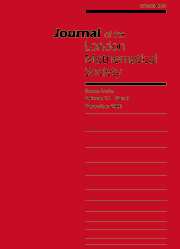Article contents
ON SIMULTANEOUS DIAGONAL INEQUALITIES
Published online by Cambridge University Press: 01 December 1999
Abstract
Let F1, …, Ft be diagonal forms of degree k with real coefficients in s variables, and let τ be a positive real number. The solubility of the system of inequalities
formula here
in integers x1, …, xs has been considered by a number of authors over the last quarter-century, starting with the work of Cook [9] and Pitman [13] on the case t = 2. More recently, Brüdern and Cook [8] have shown that the above system is soluble provided that s is sufficiently large in terms of k and t and that the forms F1, …, Ft satisfy certain additional conditions. What has not yet been considered is the possibility of allowing the forms F1, …, Ft to have different degrees. However, with the recent work of Wooley [18,20] on the corresponding problem for equations, the study of such systems has become a feasible prospect. In this paper we take a first step in that direction by studying the analogue of the system considered in [18] and [20]. Let λ1, …, λs and μ1, …, μs be real numbers such that for each i either λi or μi is nonzero. We define the forms
formula here
and consider the solubility of the system of inequalities
formula here
in rational integers x1, …, xs. Although the methods developed by Wooley [19] hold some promise for studying more general systems, we do not pursue this in the present paper. We devote most of our effort to proving the following theorem.
- Type
- Notes and Papers
- Information
- Copyright
- The London Mathematical Society 1999
- 2
- Cited by


